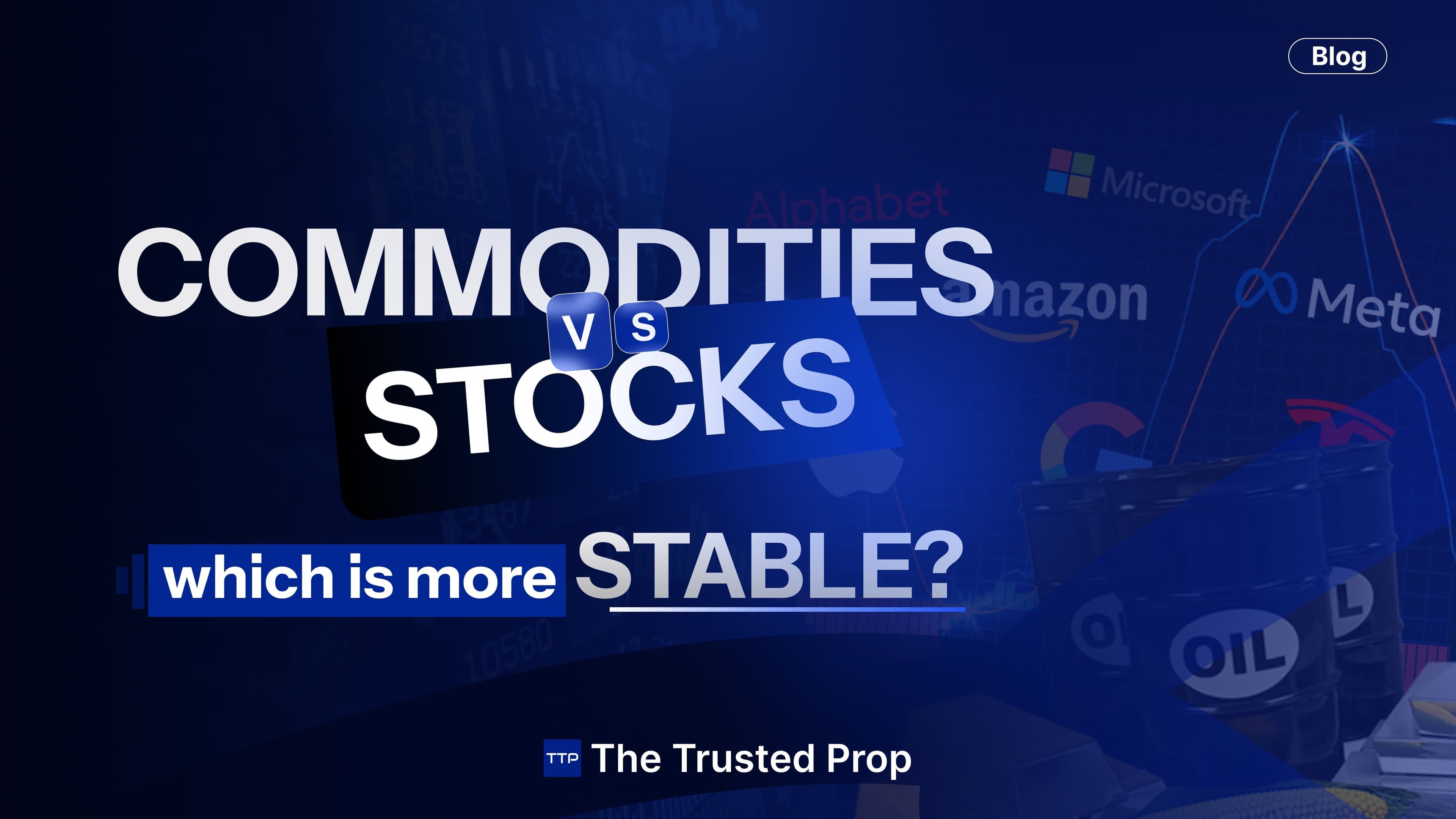Commodities vs. Stocks: Which Market is More Stable?

Commodities vs. Stocks: Which Market is More Stable?
3/30/2025
In the financial market, there are many instruments with their own unique features. Today, we discuss two major assets in the financial market: Commodities vs. Stocks. Every investor and trader's struggle is where to put their money—commodities or stocks. Certainly, these markets are open for new traders or long-term investors; stability matters. Nobody who is at ease at night wants to worry about the erratic price fluctuations or unexpected crashes. The most important question is: Which market is more stable—commodities or stocks? Let’s understand and analyse which is more stable.
What is the stock market?
The stock market is a place where investors buy and sell, involving equities, bonds, and other securities in publicly listed companies. By purchasing a stock, you buy a small piece of the company, which represents ownership. Most stock trading occurs on famous exchanges such as the New York Stock Exchange (NYSE), NASDAQ, and the London Stock Exchange (LSE). The stock market shows the health and performance of companies and gives an estimate of the entire economy. It is influenced by numerous factors, for example, corporate earnings, economic policies, interest rates, inflation, and investor sentiment. In the performance of time, the stock market has continuously demonstrated growth, and this has made it the top choice for long-term investors.
Challenges of the Stock Market
Trading on the stock market may lead to the accumulation of wealth in the absence of this phenomenon, given that the stock market comes with these challenges.
Market Volatility: People widely recognize changes in stock prices within a short time frame due to economic statistics or market sentiment.
Speculative Activity: Investors who are not advised by experts and businesses with a lot of capital sometimes artificially inflate the stock prices, thus diverting them from the inherent value of the stock.
Economic Sensitivity: The Stock is quite sensitive in terms of economics. Sometimes during the worst times of the economy, the stocks can be affected, causing the prices to drop significantly.
Company-Specific Risks: A company’s poor performance, matters of management transparency, or its getting involved in financial scandals are some of the factors that can cause massive price reductions for its stock.
What is the Commodities Market?
The commodities market is where you can buy and sell raw materials or goods taken from the soil, such as wheat, rice, and tangible products, gold, silver, crude oil, natural gas, coffee, and soybeans. Markets for these goods are the oldest in the world, but they are the most important for today's small trading. Traders usually perform commodities trading using futures contracts, spot markets, or other derivative instruments. Commodities trading is the trade of commodities (raw materials and primary goods) where producers and consumers are given a chance to hedge against price risks. This, apart from that, also attracts traders who are looking to profit from price volatility.
Challenges of the Commodities Market
The commodities market is a billion-dollar industry with a successful return. However, it is very capricious and impeded by its complexities:
High Price Volatility: Commodity prices are at risk from supply and demand issues, geopolitical tensions, weather changes, and natural disasters.
Global Economic Factors: Currency flakiness as well as trade policies and worldwide clashes of supply-demand stand as vital elements that affect the prices of raw materials.
Storage and Logistics Risks: Certain commodities, such as agricultural products, that have specific needs, can be stored and may spoil. Heavy Speculation: In many commuting markets, the majority of speculative trading costs the exaggeration of price swinging.
Some Basic Factors to Consider When Evaluating Market Stability
Market stability can be very well observed as a market’s price predictability and steadiness. Here are the primary factors that determine stability:
1. Market Liquidity
Liquidity is the degree to which assets can be bought or sold without affecting their price. The stock market mostly has high liquidity, particularly for large-cap companies. Stocks of companies such as Apple, Microsoft, and Reliance Industries are traded in large quantities and with a small price impact.
By contrast, one can observe that many commodities markets, especially those dealing with agricultural products or niches, have low liquidity, thereby being more prone to price swings and less stable in general.
2. Price Volatility
Volatility is more frequent in the commodities market. Commodity costs can increase overnight, reaching maximum levels because of supply chain disruptions, geopolitical disruptions, or natural disasters. The abolishment of an oil supply by OPEC, for example, may lead to a price spike immediately.
Stocks, in spite of being unstable, usually follow long-term trends that are more predictable, provided by the company’s financial performance and the situation in the economy overall.
3. Economic Sensitivity
Stock Markets are closely connected with the economy as a whole. The economy grows, corporate profits soar, and stock prices are usually higher.
On the other hand, commodities may not be in line with the economic cycles. They are more associated with global supply-demand mismatches, weather conditions, and political events.
4. External Influences
The stock market is most influenced by company moves and news, mergers, earnings reports, and economic policies.
Commodities, by environmental factors such as natural disasters, pandemics, wars, and export bans.
Which market is More Stable?
After understanding all the factors, we find that the stock market is more stable over the long term. Companies selling stocks have real properties and incomes. Although stock prices can fluctuate in the short term, they usually grow in parallel with the development of the economy.
The Commodities market is an example of how fast a price will surge before facing external volatility. Price can easily rapidly have sudden and even unpredictable changes when events beyond the control of a trader take place—like hurricane-stricken oil rigs, the trade war impacting soybean exports, or a gold supply shortage caused by a mining ban.
But it does not mean that commodities are not good for investments.
Commodities can protect hedge capital from inflation and currency fluctuations. In terms of price stability, stocks lead the way.
The Final Verdict
We understand all the advantages and challenges of both instruments. We consider the stock market to be the most reliable long-term investment. The pricing is strongly based on corporate fundamentals, economic development, as well as regulatory oversight. In terms of investment, stocks are usually the most secure and stable for the long-term growth of your funds. Is at liberty to go stock market, which is a two-edged sword.
While it is more unstable than stocks, it offers some very rare chances for traders who are willing to take risks and like to take advantage of the global events happening. The bond market, on the other hand, is the place where the potential income and short-term gains are. "It is all down to your investment goals, risk tolerance, and trading style.”
A mixed portfolio consists of stocks of different industries and commodities. One can always use each asset for its respective strength—hence stocks might be bought as an investment in the long term, while commodities can become subject to a trade or even be held for diversification purposes if the situation is appropriate.
You may also like
The5ers Payout Rules, Profits & Withdrawals (2026 Guide)

Goat Funded Trader Instant Goat Account Explained (2026)
.jpg&w=1920&q=75)
Goat Funded Futures Rules for Challenge and Funded Phase (2026)

My Funded Futures Flex Challenge Explained (2026 Guide)

Moneta Funded Detailed Review 2026: Our Honest Verdict

Evercrest Funding Detailed Review 2026: Our Honest Verdict

Breakout Prop Detailed Review 2026: Our Honest Verdict

No FAQs are available for this topic yet.






















